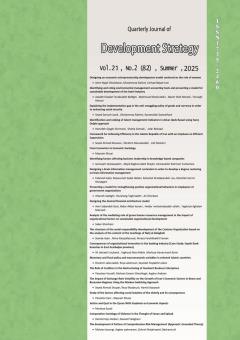Consequences of organizational innovation in the banking industry (Case Study: Sepeh Bank branches in East Azarbaijan province)
Subject Areas : Economic
Ali Jibraeli Joband
1
,
Yaqhoub Alavi Matin
2
,
Mortaza Honarmand Azimi
3
![]()
1 - PhD student in industrial management (systems management), Tabriz branch, Islamic Azad University, Tabriz, Iran
2 - Assistant Professor, Department of Management, Tabriz Branch, Islamic Azad University, Tabriz, Iran
3 - Department of Management, Tabriz Branch, Islamic Azad University, Tabriz, Iran
Keywords: organizational innovation, organizational productivity, organizational sustainability, organizational performance, job engagement.,
Abstract :
Background and objective: Innovation in an organization is critical to achieve operational success, which significantly affects the success and performance of an organization. Therefore, the present research, understanding the importance of organizational innovation, seeks to identify the consequences of organizational innovation in the banking industry in Sepeh Bank branches in East Azerbaijan province. Methodology: The current research is practical in terms of purpose. The statistical population includes all previous researches. To collect data, internal and external databases were searched, which included 156 articles. In this regard, keywords related to the purpose of the research were searched, and with the purpose of targeted sampling, 91 articles of the most relevant researches were selected as a statistical sample. Findings and results: The findings of the research showed that the consequences of organizational innovation include 54 basic themes, 8 organizing themes and 4 inclusive themes. The results of the research showed that the consequences of organizational innovation have four overarching themes of organizational productivity (efficiency, effectiveness); organizational sustainability (response to the environment, value creation); improving the organization's performance (organizational purposefulness, organizational growth and development); Job belonging of employees (job satisfaction, professional improvement of employees).
منابع
برومند، نادر؛پناهی، علی. (1402). تاثیر فناوری اطلاعات بر عملکرد سازمانی با نقش میانجی عملکرد نوآوری. مطالعات راهبردی در صنعت نفت و انرژی. 56(14)، 59-78.
رحیمی، اکبر؛ علیپوری زاده، حسین؛ محمودآبادی، سمیرا. (1402). بررسی تاثیر مدیریت دانش بر چابکی سازمانی با تاکید بر نقش میانجی گری نوآوری سازمانی (نمونه پژوهش: سازمان های پژوژه محور دفاعی). مدیریت دانش سازمانی، 6(2)، 21-52.
کلابی، امیرمحمد. (1401). مدل تعهد سازمانی با تبیین جایگاه نوآوری سازمانی، فرهنگ سازمانی، مسئولیت اجتماعی شرکتی و خلق ارزش مشترک. پژوهش های مدیریت عمومی، 15(56)، ۱۶۵ – ۱۹۴
مولایی، اکبر؛ یزدانی، ناصر؛ کاظمی، فاطمه. (1401). تاثیر نوآوری سازمانی بر عملکرد صادراتی با نقش میانجی نوآوری فناورانه تحول گرا و گسترده. مطالعات مدیریت راهبردی، 13(49)، ۱۴۵ – ۱۶۳.
یاراحمدی خراسانی،علیرضا؛ قربانی، محمود؛ فریبرزی، الهام. (1400). طراحی مدل ارتقای قابلیتهای نوآوری سازمانی با رویکرد تاب آوری سازمانی در شرکتهای دانش بنیان. چشم انداز مدیریت دولتی، 12 (4)، 52-69.
Ardito, L., Raby, S., Albino, V., & Bertoldi, B. (2021). The duality of digital and environmental orientations in the context of SMEs: Implications for innovation performance. Journal of Business Research, 123, 44-56.
Arocco S, Marini M and Talamo A (2024). Enhancing organizational processes for service innovation: strategic organizational counseling and organizational network. nalysis. Front. Res. Metr. Anal. 9:1270501. doi: 10.3389/frma.2024.1270501.
AristanaI, I.N., WardanaI, I. M. D., Putra, M. A. (2024). Entrepreneurial leadership and organizational innovation: The role of mediating analysis. Journal Ekonomi dan Bisnis, 27(1):71-100.
Groenewald, I. S., Jawed, M., Shaikh, A. I., Akram, S., Tabuena, A. C., & Muhammad, N. (2024). Statistical analysis of psychological empowerment, job satisfaction, organizational commitment, and organizational innovation. Remittances Review, 9(1), 2765–2776.
Jiménez - Jiménez, D., & Valle, R.S. (2011), Innovation, organizational learning, & performance, Journal of Business Research, 64(4), 408-419.
Kahn, K. B. (2018). Understanding innovation of organization. Business Horizons, 61(3), 453–460
khter P. & Chaity N.S. (2024). Explores the Relationship between Organizational Culture and Organizational Performance in the Bangladeshi Microfinance Sector: Organizational Innovation is a Mediating Factor. ESI Preprints. 434-452.
Mai, N.K., Do, T.T. & Ho Nguyen, D.T. (2022), The impact of leadership competences, organizational learning and organizational innovation on business performance. Business Process Management Journal, 28(5/6), 1391-1411.
Ouakouak M. L., & Ouedraogo N. (2017). Antecedents of employee creativity and organizational innovation: An empirical study. International Journal of Innovation Management, 21(7), 1–26.
Saeed, H., Som, H. M., Mahmood, R., Hamid, H. (2023). Organizational innovation and leadership styles in healthcare with the mediating role of organizational culture. Journal of health administration, 25(4), 69-86.
Shanker, R., Bhanugopan, R., Van der Heijden, B. I., & Farrell, M. (2017). Organizational climate for innovation of organization and organizational performance: The mediating effect of innovative work behavior. Journal of Vocational Behavior, 100, 67–77.
Sung, Y.K. and Kim, S.W. (2019) Recent Advances in the Development of Gene Delivery Systems. Biomaterials Research, 23(8), 1-10.
Sutanto, Eddy Madiono. (2017). The influence of organizational learning capability and organizational creativity on organizational innovation of Universities in East Java, Indonesia, Asia Pacific Management Review, 1-8.
YahiaMarzouk, Y. and Jin, J. (2022). Linking environmental scanning and organizational innovation with competitive advantage: evidence from Egyptian SMEs. Management & Sustainability: An Arab Review, 1(2), 170-195.
Zhang, X., Chu, Sh., Ren, l., Xing, j. (2023). Open innovation and sustainable competitive advantage: The role of organizational learning. Technological Forecasting and Social Change, 186(A), 122114
Zheng H, Lu J, Chen Y, Gu Y and Zheng Z (2024), A game study on the impact of employees’ deviant innovation behaviors on firms’ organizational innovation performance. Front. Phys. 6(24), 1-8.


